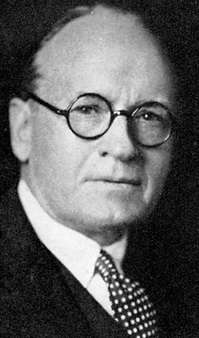James Edwin Ruthven Carpenter, Jr.
| James Edwin Ruthven Carpenter, Jr. | |
|---|---|
 J. E. R. Carpenter in 1932 | |
| Born |
January 7, 1867 Columbia, Maury County, Tennessee |
| Died |
June 11, 1932 (aged 65) New York City, New York |
| Nationality | American |
| Alma mater |
University of Tennessee Massachusetts Institute of Technology École des Beaux Arts |
| Occupation | Architect |
James Edwin Ruthven Carpenter, Jr. (also known as J. E. R. Carpenter) (January 7, 1867 – June 11, 1932) was the leading architect of luxury residential high-rise buildings in New York City in the early 1900s.[1][2][3][4] He studied at the University of Tennessee and at the Massachusetts Institute of Technology, from which he graduated in 1884. He then studied at the École des Beaux Arts in Paris.[5]
Personal life
He married 9 February 1899[6] to Marion Stires, who was born in December, 1870 in Virginia or Georgia, a daughter of Van Rensselaer W. and Letitia (Milmore) Stires. She died on October 24, 1956 in New York City, survived by a grandson and two great-grandchildren. She was an art collector.[7] J. E. R. Carpenter's death generated two prominent obituaries: one in the June 12, 1932 issue of the New York Times[8] and one in the August 1932 issue of The Architectural Forum.[9]
Career
Carpenter worked in Nashville, Tennessee in 1888, in Norfolk, Virginia in 1890, and later in New York City; he published an architecture book, Artistic Homes for City and Suburb, in 1892.[10] He designed the Epworth Methodist Episcopal Church at Norfolk (1894-1896).[11] Carpenter's first commission, in 1909, was for 116 East 58th Street, a nine-story apartment house, since demolished.[5] His designs in Tennessee include the Columbia military arsenal (later the Columbia Military Academy), the Maury County Courthouse, the Kirkland Tower at Vanderbilt University, the Hermitage Hotel, Lynmeade Mansion and the Stahlman Building in Nashville, the Hurt Building in Atlanta, the American National Bank Building (Pensacola, Florida), and several noteworthy buildings in New York City, including 907 Fifth Avenue, 620 Park Avenue, 625 Park Avenue, 825 Fifth Avenue, 819 Park Avenue, 550 Park Avenue, completed in 1917, and the Lincoln Building (42nd Street, Manhattan), completed in 1930.[9][12]
One distinctive aspect of Mr. Carpenter’s work is his pairing of buildings — sibling structures facing each other across a side street, like 1115 and 1120 Fifth, at 93rd Street; 1148 and 1150 Fifth, at 96th Street; and 1165 and 1170 Fifth, at 98th Street.[5]
Reception
Carpenter's work was described in a New York Times ad in 1930 as having a "quiet, restful feeling about [his] apartments — in their large, high-ceiling rooms, the careful finish of detail, the skilled but unobtrusive service."[5]
Bibliography
- Alpern, Andrew; Christopher Gray, preface. David Netto, foreword. The New York Apartment Houses of Rosario Candela and James Carpenter. New York: Acanthus Press, 2001. ISBN 978-0-926494-20-6
References
- ↑ John E. Wells and Robert E. Dalton: The Virginia Architects, 1835 - 1955, A Biographical Dictionary, New South Architectural Press, Richmond, Va., 1997, p. 75.
- ↑ Carroll Van West: "J. Edwin R. Carpenter 1867-1932" in The Tennessee Encyclopedia of History and Culture, http://tennesseeencyclopedia.net/imagegallery.php?EntryID=C035, Tennessee Historical Society, 1998.
- ↑ Henry F. Withey and Elsie Rathburn Withey: Biographical Dictionary of American Architects (Deceased), New Age Publishing Co., Los Angeles, Calif., 1956, p. 109.
- ↑ James T. White & Co., Publishers: National Cyclopedia of American Biography, New York, N.Y., 1935, Vol. 24, p. 271.
- 1 2 3 4 Gray, Christopher (August 26, 2007). "The Architect Who Shaped Upper Fifth Avenue". New York Times. Retrieved 16 August 2010.
- ↑ "Virginia, Marriages, 1785-1940," index, FamilySearch (https://familysearch.org/pal:/MM9.1.1/XRXG-Q65 : accessed 08 Jan 2014), J. E. R. Carpenter and M. S. Stires, 09 Feb 1899.
- ↑ The New York Times, issue of 25 Oct 1956, p. 33, col. 2, "Mrs. James Carpenter."
- ↑ The New York Times, issue of 12 Jun 1932, p. 30, col. 1, "J. E. R. Carpenter, Architect, Is Dead."
- 1 2 Withey & Withey, 1956, p. 109.
- ↑ Wells & Dalton, 1997, p. 75.
- ↑ Dianne M. Ball (April 1994). "National Register of Historic Places Inventory/Nomination: Epworth United Methodist Church" (PDF). Virginia Department of Historic Resources.
- ↑ West, http://tennesseeencyclopedia.net/imagegallery.php?EntryID=C035, 1998.